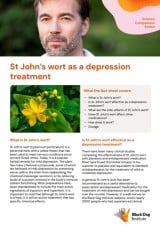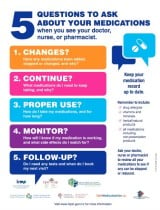St John’s wort is a herb. Its flowers and leaves are used to make a plant product marketed for the treatment of depression and other conditions such as symptoms of menopause and pain.
It's also called by it's scientific Latin name, Hypericum or Hypericum perforatum.
How St John’s wort works isn't fully understood but it's believed to affect certain chemicals in your body, such as serotonin and noradrenaline. In this way it's thought to improve mood.
Although St John’s wort is a herb, it contains active ingredients that have specific chemical effects in your body.
St John's wort interacts with medicines used to treat depression and other illnesses. It's important to let your healthcare provider know if you want to try St. John's wort so they can check if it might interfere with other medicines you're taking. Read more about St John's wort interacting with other medicines.
In Aotearoa New Zealand St John’s wort isn't registered as a medicine but is considered a herbal supplement or complementary medicine.
There are no standardised St John's wort preparations in Aotearoa New Zealand. St John's wort is available in a variety of formulations such as tablets, capsules, liquid tinctures and teas from supermarkets, health food stores and pharmacies.









